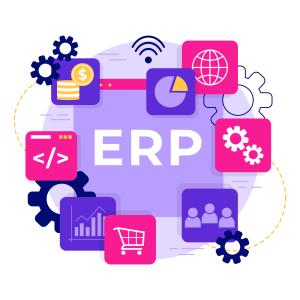In the ever-evolving landscape of e-commerce, businesses are continuously seeking innovative solutions to streamline operations, boost productivity, and enhance customer experiences. One such transformative tool is ERP (Enterprise Resource Planning). In this blog, we'll explore what ERP is and how it works with e-commerce, using a UK example to illustrate its remarkable impact.
What is ERP?
ERP is a comprehensive software system that integrates various business processes and functions into a single unified platform. It acts as a central hub that facilitates seamless communication and data sharing between different departments within an organization. ERP encompasses areas such as finance, human resources, inventory management, order processing, and more.
How ERP works with E-commerce
The integration of ERP with e-commerce brings numerous benefits that foster operational efficiency and growth. Let's delve into some key ways ERP enhances the e-commerce landscape:
Centralized Data Management: With ERP, businesses can consolidate data from various sources, including sales, inventory, and customer information, into a single database. This centralisation ensures real-time visibility and accessibility, enabling faster decision-making and reducing the likelihood of data discrepancies.
Streamlined Inventory Control: ERP provides e-commerce businesses with accurate and up-to-date inventory information. This real-time data helps prevent stockouts, overselling, and backorders, ensuring a seamless shopping experience for customers.
Efficient Order Processing: The integration of ERP with e-commerce automates order processing. As soon as a customer places an order, the ERP system updates inventory levels, initiates the picking and packing process, and generates shipping labels. This automation accelerates order fulfilment and minimises the risk of human errors.
Enhanced Customer Insights: ERP captures and analyses customer data, such as purchase history, preferences, and behaviour. E-commerce businesses can leverage this information to personalise marketing campaigns, recommend products, and offer targeted promotions, leading to higher customer satisfaction and loyalty.
Real-time Analytics and Reporting: ERP's reporting and analytics capabilities provide valuable insights into business performance. E-commerce managers can monitor key performance indicators (KPIs) in real-time, enabling data-driven decision-making and strategic planning.
A UK Example: XYZ Gadgets
XYZ Gadgets, a leading UK-based e-commerce retailer specialising in consumer electronics, experienced the transformative power of ERP integration. Before ERP implementation, XYZ Gadgets struggled with inefficient order processing, inventory discrepancies, and fragmented data across multiple systems.
With the implementation of an ERP system, XYZ Gadgets achieved remarkable improvements. Their inventory management became more accurate, resulting in a significant reduction in stockouts. Automated order processing streamlined their fulfilment process, leading to faster delivery times and increased customer satisfaction.
Moreover, XYZ Gadgets utilized ERP-generated customer insights to tailor personalised marketing campaigns. By offering targeted discounts and promotions based on individual preferences, they witnessed a substantial increase in repeat purchases and customer loyalty.
In Summary
ERP integration has become a game-changer for e-commerce businesses in the UK, like XYZ Gadgets, as it empowers them to optimise processes, boost productivity, and deliver exceptional customer experiences. By centralising data, streamlining inventory control, automating order processing, and providing real-time analytics, ERP propels e-commerce companies towards sustainable growth and success in the competitive digital marketplace. If you want to stay ahead of the curve and unlock the full potential of your e-commerce business, ERP is undoubtedly the way to go.
For all of your ERP integration requirements, please call the Comtecs Team on 01892 514636 to assist with enhancing your ecommerce efficiency.
